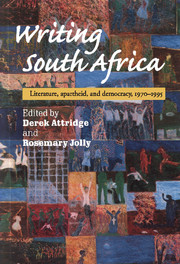Book contents
- Frontmatter
- Contents
- Contributors
- Acknowledgements and note on references
- South Africa, 1930–1996: a chronology
- Maps
- 1 Introduction
- 2 Interrogating silence: new possibilities faced by South African literature
- 3 I am dead: you cannot read: André Brink's On the Contrary
- 4 Endings and new beginning: South African fiction in transition
- 5 The post-apartheid sublime: rediscovering the extraordinary
- 6 Postmodernism and black writing in South Africa
- 7 Shame and identity: the case of the coloured in South Africa
- 8 A man's world: South African gay writing and the State of Emergency
- 9 The final safari: on nature, myth, and the literature of the Emergency
- 10 Interview
- 11 Speech and silence in the fictions of J.M.Coetzee
- 12 ‘Dialogue’ and ‘fulfilment’ in J.M. Coetzee's Age of Iron
- 13 Interview
- 14 Inside out: Jeremy Cronin's lyrical politics
- 15 Spinning out the present: narrative, gender, and the politics of South African theatre
- 16 South African theatre in the United States: the allure of the familiar and of the exotic
- Position papers
- Select bibliography: South African literary writing in English, 1970–1995
- Index
13 - Interview
Published online by Cambridge University Press: 05 July 2011
- Frontmatter
- Contents
- Contributors
- Acknowledgements and note on references
- South Africa, 1930–1996: a chronology
- Maps
- 1 Introduction
- 2 Interrogating silence: new possibilities faced by South African literature
- 3 I am dead: you cannot read: André Brink's On the Contrary
- 4 Endings and new beginning: South African fiction in transition
- 5 The post-apartheid sublime: rediscovering the extraordinary
- 6 Postmodernism and black writing in South Africa
- 7 Shame and identity: the case of the coloured in South Africa
- 8 A man's world: South African gay writing and the State of Emergency
- 9 The final safari: on nature, myth, and the literature of the Emergency
- 10 Interview
- 11 Speech and silence in the fictions of J.M.Coetzee
- 12 ‘Dialogue’ and ‘fulfilment’ in J.M. Coetzee's Age of Iron
- 13 Interview
- 14 Inside out: Jeremy Cronin's lyrical politics
- 15 Spinning out the present: narrative, gender, and the politics of South African theatre
- 16 South African theatre in the United States: the allure of the familiar and of the exotic
- Position papers
- Select bibliography: South African literary writing in English, 1970–1995
- Index
Summary
This exchange is abstracted from an interview recorded in Cape Town on 9 May 1995. It was edited by Malcolm Hacksley and published by the National English Literary Museum in Grahamstown, South Africa, in a collection of interviews with black South African writers entitled Reflections: Perspectives on Writing in Post-Apartheid South Africa (1996).
RS Would you fill me in briefly about your personal background, some of the factors that formed the writer and politician Wally Serote as he appears today?
MWS I was born in Alexandra, a highly politicized community. For one reason or another, I thought I wanted to write and I started writing at quite an early age. The two, politics and writing, have played a key role in my formation as a person: the two feed on each other. My political involvement, being an active member of the ANC, MK, and the underground structures of the African National Congress, has helped me to understand the dynamics of people. That in itself has fed into what I write.
RS You served time in detention. Was that in the early seventies?
MWS I was detained in 1969.
RS Were you subjected to harsh treatment?
MWS First of all I was detained under what they called the Terrorism Act, Section 6, which means that you were kept in solitary confinement, incommunicado. You were entirely in the hands of the security police. I was harshly tortured, physically.
- Type
- Chapter
- Information
- Writing South AfricaLiterature, Apartheid, and Democracy, 1970–1995, pp. 180 - 186Publisher: Cambridge University PressPrint publication year: 1998
- 1
- Cited by



